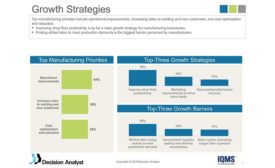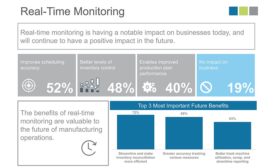Articles by Louis Columbus
Software & Analysis
Manufacturers’ Top Demands For Quality Software in 2022
The bottom line is that manufacturers know they need to improve how integrated quality data is across the company.
May 8, 2022
Demystifying the Digital in Quality Management
Initial efforts at digital transformation uncover just how dependent many manufacturers are on manual updates to reports, spreadsheets, and schedules.
March 15, 2020
Taking a Data-Driven Approach to Commercial Automotive Quality
This approach gives manufacturers the data and insights to maximize their quality and efficiency.
November 8, 2019
Defining the Future of ERP in a Quality-Driven World
Manufacturers require ERP systems that can “learn” what excellent quality looks like.
September 1, 2019
How High-Performing Medical Manufacturers Turn Quality into Growth
Some manufacturers excel at reducing the latency between capturing data and turning it into valuable insights.
February 8, 2019
How Quality Helps Customers Soar Applying Real-World Best Practices in Aerospace Quality
In the aerospace industry, lives are at risk if a product doesn’t adhere to the processes and procedures we have in place.
November 15, 2018
Seven Ways Gage Management Improves Product Quality and Enables Growth
Manufacturers can significantly improve their visibility into operations through gage repeatability and reproducibility (GR&R) studies.
June 8, 2018
Stay in the know with Quality’s comprehensive coverage of
the manufacturing and metrology industries.
eNewsletter | Website | eMagazine
JOIN TODAY!Copyright ©2024. All Rights Reserved BNP Media.
Design, CMS, Hosting & Web Development :: ePublishing








